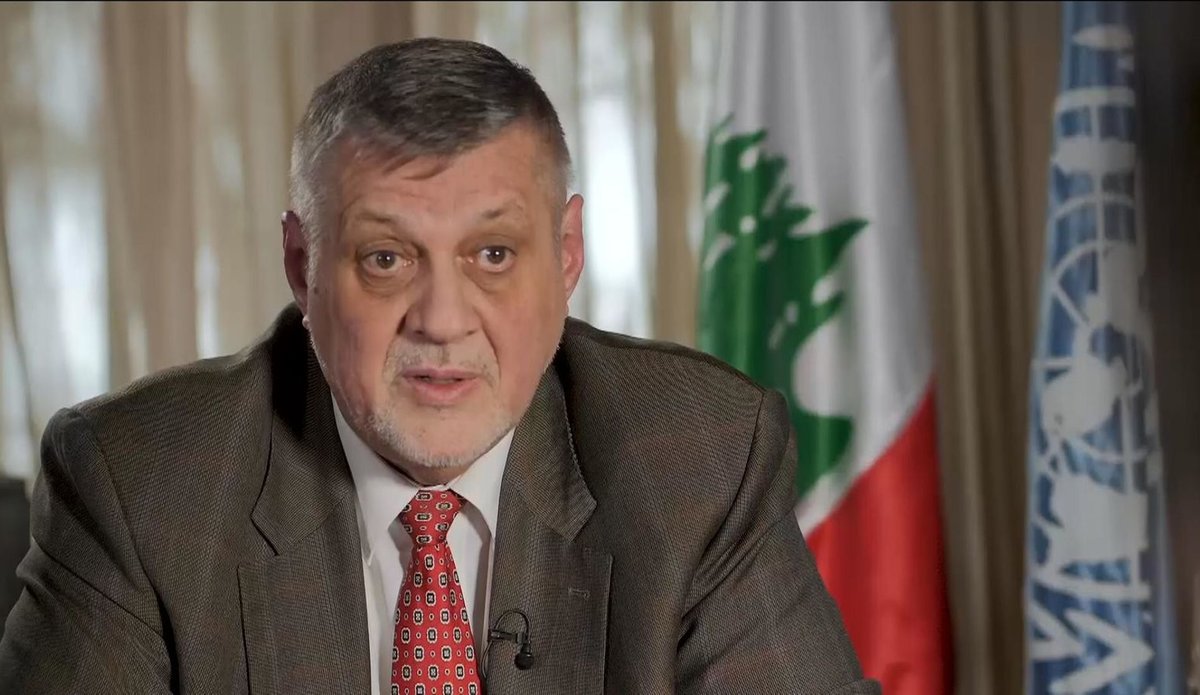Interview of UN Special Coordinator for Lebanon Jan Kubis with Sky News
Interview of UN Special Coordinator for Lebanon Jan Kubis with Sky News
'Europe faces new wave of migrants unless Lebanon acts,' U.N. official warns
Jan Kubis, a former Slovakian foreign minister, has told Sky News that Lebanon faces a new level of social unrest and chaos without the implementation of reforms to address a deepening economic crisis.
"The next phase of the crisis, without being addressed by the reforms, will be much more difficult. The problems will deepen," he said.
Mr. Kubis' previous UN postings were in Iraq and Afghanistan. He knows what failed states look like, and he warned of the dangers of Lebanon becoming another.
"Without reforms, the crisis will turn into a security crisis. Then of course we will have not only those Syrians that are still in droves as refugees [here] but many others, starting with the Lebanese, that simply try to example this kind of social strife."
Lebanon has seen nationwide protests since last October with hundreds of thousands of people demanding an end to corruption and a new apolitical government of technocrats.
The country's economy is struggling, and more than 200,000 jobs have been lost since the crisis began.
Local estimates say 10% of companies in Lebanon have gone out of business and many employees have had their salaries cut.
Banks have imposed limits on how much people can withdraw from their own accounts - in some cases as little as the equivalent of £150 every fortnight.
Two weeks ago, a new government was appointed in an attempt to meet the protesters' demands.
Most of the new ministers, including the new Prime Minister Hassan Diab, are academics and not members of the political establishment whose alleged corruption the protesters see as the cause of the financial crisis.
However, because they were selected by Lebanon's powerful establishment blocs, many of the protesters have remained on the streets.
On Tuesday and Wednesday the new government faces a vote of confidence in the parliament. It is likely to pass and pave the way for sweeping and "painful" reforms.
The vote is expected to prompt more large protests.
Huge concrete barriers have been erected around the parliament building in anticipation.
Mr. Kubis' assessment of the state of the country is bleak.
"Myriads of deep crises happening at the same time," he said.
"Some are saying that it's an existential crisis for Lebanon. But also, and I hope very much, certain opportunities that might come provided that the government that is in the making will be determined, bold enough to quickly introduce and implement a set of reforms in many areas."
And he warned that Lebanese security and stability is critical for Europe.
"Politics is local and if you look at what is sometimes very obvious, the political discussions in a number of countries in Europe is their fear of another wave of migration. And they know very well that Lebanon is not around the globe," he said.
"Lebanon is on the shores of the Mediterranean. Just look at what is happening now. Look at the waves of migration being generated by many other countries. And what is the destination? It's Europe."
Western governments have pledged to help Lebanon but only if it can prove that it is seriously tackling the crisis. Mr. Kubis welcomed this.
"Politicians in Europe must understand that the more they will support real reforms in Lebanon, provided Lebanon will go into real reforms, this is better for them because they can maybe stabilize the situation to such an extent that it will
 UN
UN





